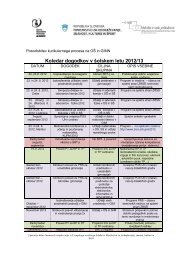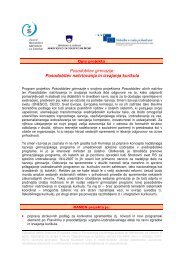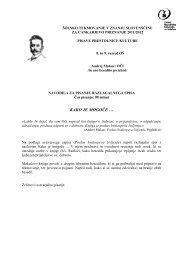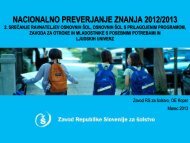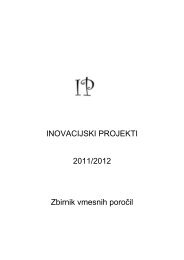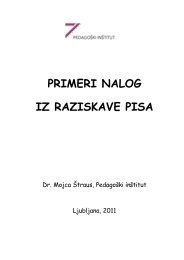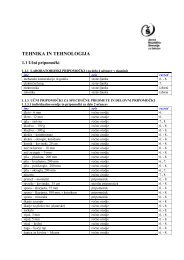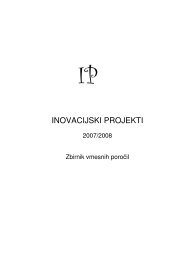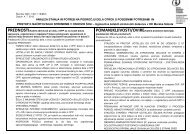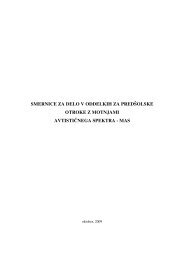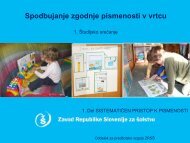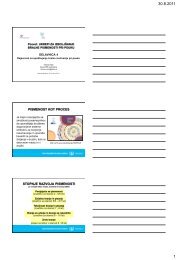You also want an ePaper? Increase the reach of your titles
YUMPU automatically turns print PDFs into web optimized ePapers that Google loves.
Tekmovanje iz anglešine <strong>2010</strong>/20<strong>11</strong>TEKMOVANJE IZ ANGLEŠINEVODNIKUVODTekmovanje je namenjeno uencem <strong>za</strong>kljunega razreda osnovne šole, ki se <strong>za</strong> jezik posebej<strong>za</strong>nimajo in izkazujejo nadpovpreno raven obvladovanja ustne in pisne komunikacije vanglešini.Tekmovalne naloge imajo <strong>za</strong> podlago uni nart <strong>za</strong> osnovno šolo. V smislu vzpodbujanjakreativnosti in medkulturne o<strong>za</strong>vešenosti so tekmovalne naloge oblikovane tako, da na šolskiravni spodbujajo zdravo tekmovalnost in služijo populari<strong>za</strong>ciji jezika ter selekciji, na regijskiin državni ravni pa so <strong>za</strong>snovane na literarnem delu, ki je objavljeno v Razpisu. Šolska raventemelji na preverjanju bralnega razumevanja, rabe jezika in pisnega sporoanja. Regijsko indržavno tekmovanje temeljita na izbrani literarni predlogi in tako spodbujata veselje do branjain razvijanje bralne zmožnosti, ter pisnega sporoanja.Tekmovanje vsebuje naloge bralnega razumevanja, rabe jezika in pisnega sporoanja. Pravslednje je med dale najbolj <strong>za</strong>htevnimi zmožnostmi, saj <strong>za</strong>hteva poznavanje in uporabobesediša, slovninih struktur, kakor tudi zmožnost koherentnega pisanja na ravni odstavka insestavka. Od tekmovalcev priakujemo, da bodo pisali tudi kreativno. Vse zgoraj našteto sosicer cilji, ki so predvideni na podroju razvijanje pisnega sporazumevanja v <strong>za</strong>dnjem triletjudevetletne osnovne šole, seveda predvsem <strong>za</strong> tretjo raven <strong>za</strong>htevnosti, vendar naloge takšnegatipa pomenijo nadgradnjo unega narta, saj pisanje na osnovi literarne predloge v osnovnišoli ni predvideno.1
Tekmovanje iz anglešine <strong>2010</strong>/20<strong>11</strong>1. Shema tekmovalne naloge na šolski ravniOpisOcenjevanjeBralnorazumevanjeRaba jezikanaloge, kipreverjajouenevezmožnostibranja inbralnegarazumevanjaNaloge, kipreverjajopoznavanje inrabo slovnice inbesedišana podlagi navodil,ki jih pripravi tekmovalna komisija <strong>za</strong>anglešino, ocenjevalec je uitelj mentor.na podlagi navodil,ki jih pripravi tekmovalna komisija <strong>za</strong>anglešino, ocenjevalecje uitelj mentor.Pisnosporazumevanjenaloge, kipreverjajouenevozmožnostpisnegasporoanjana podlagi navodil,ki jih pripravi tekmovalna komisija <strong>za</strong> anglešino(ocenjevalec jeuitelj mentor).2
Tekmovanje iz anglešine <strong>2010</strong>/20<strong>11</strong>2. Shema tekmovalne naloge na regionalni ravniOpisOcenjevanjeSlušnorazumevanjeNaloge, kipreverjajouenevezmožnostislušnegarazumevanjaNa podlagi navodil, ki jih pripravi tekmovalnakomisija <strong>za</strong> anglešino, ocenjevalec je uiteljmentor.BralnorazumevanjeRaba jezikanaloge, kipreverjajouenevezmožnostibranja inbralnegarazumevanjaNaloge, kipreverjajopoznavanje inrabo slovnice inbesedišana podlagi navodil,ki jih pripravi tekmovalna komisija <strong>za</strong>anglešino, ocenjevalec je uitelj mentor.na podlagi navodil,ki jih pripravi tekmovalna komisija <strong>za</strong>anglešino, ocenjevalecje uitelj mentor.Pisnosporazumevanjenaloge, kipreverjajouenevozmožnostpisnegasporoanjana podlagi navodil,ki jih pripravi tekmovalna komisija <strong>za</strong>anglešino, ocenjevalecje uitelj mentor.Naloge temeljijo na literarnem delu, ki je objavljeno v Razpisu.3
Tekmovanje iz anglešine <strong>2010</strong>/20<strong>11</strong>3. Shema tekmovalne naloge na državni ravniOpisOcenjevanjePisnosporazumevanjenaloge, kipreverjajouenevozmožnostpisnegasporoanjana podlagi navodil,ki jih pripravi DK <strong>za</strong> anglešino (ocenjevalec jeuitelj mentor).Naloge temeljijo na literarnem delu, ki je objavljeno v Razpisu.Slušno razumevanjeZ nalogami slušnega razumevanja uenci pokažejo, da razumejo avtentino besedilo izznanega tematskega podroja:• znajo izlušiti podrobnosti• znajo povzeti kljune informacijeViri slušnih besedil: asopisi, najstniške revije, prospekti, knjige, internet itd.Organi<strong>za</strong>cijaNavodila <strong>za</strong> reševanje nalog bralnega razumevanja so v anglešini. Vsaka naloga vsebujerešen prvi primer. Uenci ne uporabljajo slovarjev.Vrste besedilBesedila so informativna, pripovedna in opisna. Dolžina govorjenih besedil se spreminjaglede na podspretnost, ki se preverja, in glede na nalogo. Dolžina slušnega besedila je do 3minute.Vrste besedil:• zgodbe,• poroila,4
Tekmovanje iz anglešine <strong>2010</strong>/20<strong>11</strong>• opisi,• pripovedi,• pogovori dveh ali ve ljudi o vsakdanjih temah,• obvestila,• poroila o dogodkih in dejavnostih,• navodila,• reklame,• intervjuji.Spretnosti, ki preverjajo razumevanje govorjenega besedila:• uenec izluši glavne misli govorjenega besedila (ang. skimming),• uenec poiše doloene informacije v besedilu (ang. scanning).Vrste nalogNaloge <strong>za</strong>htevajo nebesedni in/ali kratek besedni odziv.Vsaka naloga vsebuje od 5 do 7 vprašanj (testnih postavk), na primer:• prenos podatkov v drugo obliko,• povezovanje slušnega besedila s slikami,• izbirni tip nalog,• naloge kratkih odgovorov,• naloge dopolnjevanja besedila z besedami ali besednimi zve<strong>za</strong>mi,• beleženje pod naslovi/po kategorijah,• <strong>za</strong>pisovanje podatkov.Navedene so možne vrste nalog <strong>za</strong> preverjanje slušnega razumevanja. To pa ne pomeni, dabodo vse tudi uporabljene.VrednotenjeVrednotenje je objektivno. Vsak pravilen odgovor je vreden po 1 (eno) toko. Uiteljimentorji uporabljajo navodila <strong>za</strong> vrednotenje, ki jih pripravi DK.Bralno razumevanjeZ nalogami bralnega razumevanja uenci pokažejo, da znajo prebrati in razumejo: avtentina angleška besedilaViri besedil so : asopisi, najstniške revije, prospekti, knjige, internet itd.5
Tekmovanje iz anglešine <strong>2010</strong>/20<strong>11</strong>Organi<strong>za</strong>cijaNavodila <strong>za</strong> reševanje nalog bralnega razumevanja so v anglešini. Vsaka naloga vsebujerešen prvi primer. Uenci ne uporabljajo slovarjev.Vrste besedilBesedila so informativna, pripovedna, in opisna. So ustrezno lenjena in jasnostrukturirana. Izbira dolžine besedil se spreminja glede na podspretnost, ki se preverja, inglede na nalogo. Dolžina besedila <strong>za</strong> preverjanje bralnega razumevanja je je od 200 do500 besed.Vrste besedil: krajše pripovedi, zgodbe, basni, razglednice, <strong>za</strong>sebna pisma, poroila o dogodkih in dejavnostih, navodila, opisi poti ali smeri, pravljice kratki življenjepisi, lanki iz mladinskih asopisov na doloeno temo, besedila iz spleta.Dejavnosti:• odgovarjanje na vprašanja• povezovanje besedil z naslovom• razvršanje in urejanje pomešanih povedi ali odstavkov• dopolnjevanje besedila• upoštevanje navodil (iskanje poti na zemljevidu, …)• izpolnjevanje table• …6
Tekmovanje iz anglešine <strong>2010</strong>/20<strong>11</strong>N.B.: Zgoraj so navedene možne vrste nalog <strong>za</strong> preverjanje bralnega razumevanja. To paseveda ne pomeni, da bodo vse vrste nalog <strong>za</strong>jete v tekmovalni nalogi vsakokrat in/ali dabodo uporabljene vedno v enakem vrstnem redu.OcenjevanjeVrste nalog in vprašanj <strong>za</strong> preverjanje bralne zmožnosti so ' <strong>za</strong>prtega tipa', kar omogoaobjektivno ocenjevanje. Vsak pravilni odgovor je vreden po 1 (eno) toko. Naloge ocenjujejouitelji mentorji. Pri ocenjevanju uporabljajo vnaprej pripravljena navodila <strong>za</strong> ocenjevanje, kijih pripravi DK.Jezikovno znanje in sposobnosti ter besedišeV tem delu preizkusa se preverja sposobnost uporabe jezikovnih <strong>za</strong>konitosti ter bogastvobesediša in ustreznost njegove rabe.Organi<strong>za</strong>cijaNavodila <strong>za</strong> reševanje so v anglešini. Vsaka naloga vsebuje rešen prvi primer. Uenci neuporabljajo slovarjev.Vrste nalog:• urejanje pomešanih delov stavka,• izbirni tip nalog,• besedilo z vrzelmi ( z danim izborom besed ali brez ),• povezovanje delov povedi,• dopolnjevanje povedi ali besedila z danimi iztonicami ali brez njih,• razširjanje iztonic v povedi ali besedilo.N.B.: Zgoraj so navedene možne vrste nalog <strong>za</strong> preverjanje rabe jezika. To pa seveda nepomeni, da bodo vse vrste nalog <strong>za</strong>jete v tekmovalni nalogi vsakokrat in/ali da bodouporabljene vedno v enakem vrstnem redu.7
Tekmovanje iz anglešine <strong>2010</strong>/20<strong>11</strong>OcenjevanjeVrste nalog in vprašanj so ' <strong>za</strong>prtega tipa'(, kar omogoa objektivno ocenjevanje). Vsakpravilni odgovor je vreden po 1 (eno) toko. Naloge ocenjujejo uitelji mentorji.Pisno sporazumevanjeZ nalogami pisnega sporazumevanja se preverjajo zmožnosti tvorjenja pisnega besedila vanglešini. Tekmovalci pišejo s pomojo iztonic in samostojno ustvarjajo svoja besedila(kreativno pisanje ). Prebrano književno delo na regijskem in državnem tekmovanju jim služikot izhodiše.Tekmovalci lahko preberejo katerokoli izdajo literarnega dela: slovenski prevod,prirejeno in skrajšano besedilo, besedilo v celoti. Mentor ga izbere na podlagipoznavanja znanja in interesov tekmovalcev.Organi<strong>za</strong>cijaNavodila so v anglešini. Uenci ne uporabljajo slovarjev.Vrste besedilUenci tvorijo eno pisno besedilo izmed naslednjih možnosti: razglednico sporoilo, <strong>za</strong>sebno pismo, opis osebe, dogodka, kraja itd., kratko pripoved, zgodbo.Vrste nalogUenci tvorijo besedilo, ki je dolgo do 250 besed.Vrste vodenih nalog:8
Tekmovanje iz anglešine <strong>2010</strong>/20<strong>11</strong> dopolnjevanje besedila, dokonanje besedila opisovanje slik/fotografij in urejanje v besedilo, razširjanje <strong>za</strong>piskov v besedilo, pisanje besedil s pomojo iztonic,V nalogah se doloijo: sporoilni namen, dolžina besedila, merila <strong>za</strong> vrednotenje.OcenjevanjePisna besedila vrednotijo/ocenjujejo uitelji mentorji. Ker gre <strong>za</strong> naloge odprtega(subjektivneg) tipa, jih ocenjevalci vrednotijo po naslednjih kriterijih: Vsebina Jezikovna pravilnost Besediše Zgradba/vezljivostPri ocenjevanju uporabljajo uitelji ocenjevalci analitino ocenjevalno lestvico po merilih, kijih pripravi DK.9
Tekmovanje iz anglešine <strong>2010</strong>/20<strong>11</strong>VODEN PISNI SESTAVEKMerila <strong>za</strong> ocenjevanjeVSEBINAŠt. tokMerila5 Vsebina je izvirna, uenec/ka izvirno razvije vse <strong>za</strong>htevane dele/iztonice. Dolžina besedila je ustreznain ne odstopa bistveno od predvidene.4 Vsebina je izvirna, uenec/ka se v pretežni meri drži navodil / v sestavek vkljui skoraj vse <strong>za</strong>htevaneiztonice.3 Uenec/ka pri pisanju uporablja iztonice iz navodil in jih povezuje na zelo osnovni ravni ali vkljui vsestavek le eno od <strong>za</strong>htevanih iztonic.2 Vsebina je zelo poenostavljena ali prekratka <strong>za</strong> presojo.1 Vsebina je v glavnem neprimerna.JEZIKOVNA PRAVILNOSTŠt. tokMerila4 Besedilo vsebuje ve raznolikih slovninih struktur, nekaj osnovnih napak.3 Raba preprostih slovninih struktur, pogoste osnovne napake.2 Pogoste jezikovne napake, veina slovninih struktur je napanih.1 Slovnine napake mono ovirajo razumevanje sestavka.BESEDIŠEŠt. tokMerila3 Besediše je primerno, obasno nadpovpreno bogato.2 Besediše je primerno, osnovno in se ponavlja, opazimo nekaj napanih rab.1 Omejeno besediše, razumevanje sestavka je skoraj nemogoe.ZGRADBA/VEZLJIVOSTŠt. tokMerila3 Dobra vezljivost na ravni stavka in sestavka. Misli so jasno izražene. Napak v rabi loil skoraj ni..2 Besedilo je primerno razvito. Misli so obasno nejasno izražene. Napake v rabi loil so prisotne.1 Slaba vezljivost. Misli so nejasno izražene. Napake v rabi loil so pogoste.10
Tekmovanje iz anglešine <strong>2010</strong>/20<strong>11</strong>Skupno št. tok – 15OPOMBE:e je vsebina popolnoma neprimerna oziroma sestavek ne ustre<strong>za</strong> naslovu, nalogo ocenimo z ni tokami vceloti.e je vsebina ocenjena z 1 toko, so lahko ostale kategorije ocenjene najve z 2 tokama.Pravopisne napake spadajo v kategorijo besediša.Vloga mentorjaKar <strong>za</strong>deva delo uiteljev mentorjev v procesu priprave uencev na tekmovanje, vidimonjihovo vlogo ne zgolj v podajalcu “snovi”, temve v usmerjanju uencev pri njihovem sicervodenem, vendar samostojnem delu. Pri tem imamo v mislih delo z viri, uporabo sodobneraunalniške tehnologije, sodelovalno uenje, … in na podlagi pridobljenih podatkovoblikovanje lastnega mnenja. Uiteljem mentorjem svetujemo tudi uporabo razlinihinstrumentov spremljanja uenevega napredka (npr. Portfolio).<strong>11</strong>
Tekmovanje iz anglešine <strong>2010</strong>/20<strong>11</strong>ZGLEDI NALOGBralno razumevanje1. FridayThe following is a passage from Robinson Crusoe. Parts of sentences have been cut out andjumbled up at the bottom of the text. Put them back into the correct place.Write letters (A – J) in the spaces (1 – 8). There are two parts of sentences too many.One has been already done for you.I had now a companion, and in a short time I began to teach him to speak to me. First I let himknow that his name was to be Friday, (0) __E__ . Then I taught him everything that I thoughtwould make him useful, handy, and helpful. I clothed him in a suit made of goatskins,(1) _____. After some time had passed over, Friday came running to me one morning to saythat there was a ship in sight. Welcome as this news was, I thought I would not show myself(2) _____, and it was well that I did not. I watched in concealment and saw a boat leave theship and make for the shore. Eleven men landed, (3) _____. They were laid upon the groundwhile the rest dispersed about the island. I approached the captives and questioned them, andfound they were English, (4) _____, and the others were the mate and a passenger, and thatthere had been a mutiny on the ship, and that the men, as a favour, instead of killing them,(5) _____. I offered to aid them to recover the ship, and going back to the castle, I broughtguns and gave them to them. When (6) _____, who the captain said were the leaders, and therest, taken by surprise, yielded to us. The captain made them swear (7) _____, and thenreturned to the ship. Those on board were equally surprised at the turn affairs had taken.A and he seemed to be greatly pleased to be dressed like myselfB he provided me with clothing from his own wardrobeC and I saw that three of them were bound as captivesD were going to leave them on the islandE for that was the day I saved his lifeF the men returned to the boat we shot twoG that one was the captainH until I could learn what had brought the ship thereI and after I had arranged all my affairs, Friday and I went aboardJ that they would obey him faithfully12
Tekmovanje iz anglešine <strong>2010</strong>/20<strong>11</strong>Raba jezikaComplete the text. Write ONE word in each gap. Choose from the words suggested in thebox. There are more words than needed. The first example has been done for you.a after at become best happenshave meet rang remember saw sotoo think was when worse worstIT HAPPENED TO ME…Moving houses can be exciting, but if it happens (0) ________too_______ often it can makeyour life hell. This is Laura-Anne’s story…“My dad’s in the army and I can’t even (1) __________________ the number of times wehave moved house. Usually we move every two years, but sometimes it(2)__________________ after as little as two months. The (3) __________________ thingabout being constantly on the move is the feeling of never really belonging anywhere. So farI (4) __________________ been to ten different schools! It’s difficult to(5)__________________new friends and it makes me sad when I meet somebody I really geton with because I know that before long we will only be penpals.My parents decided to send me to (6) __________________ boarding school thinkingthat I would have more stability there, but it was even (7) __________________. I felt as ifthey had rejected me. I (8) __________________ them every night and after a month they letme join I was at home again.However, I think being (9) __________________ boarding school helped me copewith my life and one thing is certain – (10) __________________ I grow up and have myown children, I will never want to move again.13
Tekmovanje iz anglešine <strong>2010</strong>/20<strong>11</strong>Pisno sporoanjeYour penfriend Mick from Ireland has written you the following letter:Dear Ana/Tim,I am going to finish primary school soon and would like to go to a local grammar school. I amlooking forward to improving my English as well as starting to learn a new foreign language.The problem is I cannot decide whether to choose French or German. Your advice/opinionwould be of great help. I am looking forward to hearing from you.Best regards,MickIn your reply write about:· the importance of learning foreign languages· your own experience in the same situation· how you would decide if you were Mick and whyYour text should contain from140–160 words.The following will be evaluated: the contents, the structure of the text, grammar andvocabulary.Dear Mick,Thank you for your letter._____________________________________________________________________________________________________________________________________________________________________________________________________________________________________________________________________________________________________________________________________________________________________________________________________________________________________________14
Tekmovanje iz anglešine <strong>2010</strong>/20<strong>11</strong>____________________________________________________________________________________________________________________________________________________________________________________________________________________________________________________________________________________________________________________________________________________________________________________________________________________________________________________________________________________________________________________________________________________________________________________________________________________________________________________________________________________________________________________________________________________________________________________________________________________________________________________________________________________________________________________________________________________________________________________________________________________________________________________________________________________________________________________________________________________________________________________________________________________________________________________________________________________________________________________________________________________________________________________________________________________________________________________________________________________________________________________________________________________________________________________________________________________________________________________________________________________________________________________________________________________________________________________________________________________________________________________________________________________________________________________________________________________________________________________________________________________________________________________________________________________________________________________________________________________________________________________(18 tok)Love,Ana/Tim15
Tekmovanje iz anglešine <strong>2010</strong>/20<strong>11</strong>TEKMOVANJE 2009/<strong>2010</strong>ŠOLSKO TEKMOVANJE IZ ANGLEŠINE ZA UENCE9. RAZREDOV OSNOVNE ŠOLE26. november 2009Ime in priimek uenca:NALOGAMOŽNETOKEA) Reading Comprehension1. THE ONE AND ONLY ASTERIX 72. THE RAIN GOD 8B) Use of language1. LIVING UPSIDE DOWN 82. LEARN TO ACCEPT CRITICISM 7C) Writing1. E-MAIL 15Skupaj 45DOSEŽENETOKEDrage tekmovalke, dragi tekmovalci!Ocenjevalci: ___________________________Pred vami je prva preizkušnja, ki bo poka<strong>za</strong>la del vašega znanja angleškega jezika. Že dejstvo, da siželite tekmovati, pove, da imate anglešino radi in da jo nedvomno tudi dobro obvladate. Preprianismo, da bo tako tudi v prihodnje.In kako se boste lotili nalog? Svetujemo vam, da najprej preletite vse tekmovalne naloge. Sledijo si podoloenem redu, vendar se lahko sami odloite, po kakšnem vrstnem redu jih boste reševali.e imate kakšno vprašanje glede reševanja nalog, vprašajte to pred <strong>za</strong>etkom reševanja. Kasneje to nebo ve mogoe.Najprej dobro preberite navodila, nato premislite in napravite, kar naloga <strong>za</strong>hteva. Pišite itljivo. Pišitez nalivnim peresom ali keminim svinnikom, nikakor ne s svinnikom.Slovarjev danes ne boste mogli uporabljati.Za reševanje tekmovalnih nalog imate na voljo 60 minut. Želimo vam uspešno reševanje!Nalogo pripravila: državna komisija16
Tekmovanje iz anglešine <strong>2010</strong>/20<strong>11</strong>A) READING COMPREHENSION1. The One and Only AsterixRead the article and then answer thequestions bellow. The first one has beendone for you.Asterix is the main character in the comic stripseries by Goscinny and Uderzo, set in ancienttimes when the Romans ruled the world. Asterixlived in a tiny village in Gaul, as France wascalled then. His village is the only one in Gaul which is not under the control of the Romans.His most striking feature is that, unlike most other Gauls, he is extremely short and thin. Hehas got dark, friendly eyes, a big fat nose and a huge moustache. He always wears a blacksleeveless shirt, a pair of red trousers and a winged helmet, the typical costume of the Gauls.For one thing, he is extremely clever. As a result he always finds the ways to trick theRomans. However, he can be a very loyal friend and even puts himself in a great danger tosave a fellow Gaul who has been captured by the Romans. What is more. He is goodtemperedand usually managed to stay calm even in the most difficult situations. He sends animportant message to us all that freedom is worth fighting for. We hope that he continues tofight his comic battles for many more years to come.(0) Who is the main character of the comic strip series by Goscinny and Uderzo?Asterix.________________________________________________________(1) When and where is the comic strip set?______________________________________________________________(2) What is unusual about the village where the Asterix lives?___________________________________________________________________(3) What is unusual about Asterix's appearance?___________________________________________________________________(4) What is the typical costume of the Gauls like?___________________________________________________________________(5) According to the writer, what three personal qualities does Asterix have?___________________________________________________________________(6) How did Asterix react even in the hardest situations?___________________________________________________________________(7) What important message does he send to us all?___________________________________________________________________177
Tekmovanje iz anglešine <strong>2010</strong>/20<strong>11</strong>2. The Rain GodThis text is about a lorry driver and describes one of his working days. Read itcarefully and decide whether the statements below are true (T), false (F) or notgiven (NG). The first example has been done for you.It was raining now, just for a change. It was a particular type of rain that he particularlydisliked, particularly when he was driving. He had a number for it. It was rain type 17.He had read somewhere that the Eskimos had over two hundred different words for snow,without which their conversation would probably have got very monotonous. So, they woulddistinguish between thin snow and thick snow, light snow and heavy snow, snow that came inon the bottom of your neighbour’ s boots all over your nice clean igloo floor, the snows ofwinter, the snows of spring, the snows you remember from your childhood that were so muchbetter than any of your modern snows, fine snow, hill snow, valley snow, snow that falls inthe morning, snow that falls at night and so on.Rob McKenna had two hundred and thirty-one different types of rain entered in his littlebook, and he didn’ t like any of them.He shifted down another gear and the lorry heaved itsrevs up. Since he had left Denmark the previous afternoon, he had been through types 33(light pricking drizzle which made roads slippery), 39 (heavy spotting), 47 to 51 (vertical lightdrizzle through to moderate drizzle freshening), 87 and 88 (two different vertical downpours),100 (cold post-downpour rain), all the sea storm types between 192 and 213 at once, 123, 124,126, 127 (mild to intermediate cold gusting rain), <strong>11</strong> (breezy droplets) and now his leastfavourite of all, 17. Rain type 17 was a dirty blatter battering against his windscreen so hardthat it didn’ t make any difference whether he had his wipers on or off. He tested his theory byturning them off, but as it turned out the visibility did get quite a lot worse. It just failed to getbetter when he turned them back on.He hit his steering wheel, kicked the floor, thumbed his cassette player till it suddenly startedplaying Barry Manilow, thumbed it again till it stopped, and swore and swore ... At thatmoment a man appeared, standing on the road and trying to get a ride. Instead of picking himup, he splashed quite a lot of dirty water in his direction.Splattered in his rear mirror a couple of seconds later was the reflection of the hitchhiker,completely covered in muddy water by the roadside. For a moment he felt good about this. Amoment or two later he felt bad about feeling good about it. Then he felt good about feelingbad about feeling good about it and, satisfied, drove on into the night.And as he drove on, the rainclouds dragged down the sky after him, for, though he did notknow it, Rob McKenna was a Rain God. All he knew was that his working days weremiserable and he had a number of lousy holidays. All the clouds knew was that they lovedhim and wanted to be near him, to cherish him and water him.18
Tekmovanje iz anglešine <strong>2010</strong>/20<strong>11</strong>T F NG0 It was a sunny day. 1 He heard that the Eskimos had less than two hundred different wordsto describe snow.2 Rob has been a lorry driver for twenty years.3 Rob McKenna had 241 different types of rain and he wrote them downin his little book.4 There were more than 12 different types of rain accompanying himsince he left Denmark.5 Rain type 17 was his favourite type of rain.6 A hitchhiker was standing on the road for quite some time and wastrying to get a ride.7 The man Rob splashed, was furious.8 He was a Rain God and the clouds loved him.19
Tekmovanje iz anglešine <strong>2010</strong>/20<strong>11</strong>8B) USE OF LANGUAGE1. Living Upside DownComplete the text. Write one word only. The first example has been done for you.Sloths (0) are ________ medium-sized mammalsthat live (1) ______________ central and SouthAmerica. Most sloths live up in the trees so veryfew enemies (jaguars) can reach them there. This isfortunate because sloths sleep 18 hours (2)______________ day.All sloths are lazy but in general, the three-toedsloth is (3) ______________ and slower than thetwo-toed sloth. It hangs upside down from a branch of a tree almost all of(4) ______________ life. It only eats one particular kind of leaf, cecropia tree leaf. However,this is not a problem (5) ______________ there are plenty of these leaves where the slothslive. No other animals compete with the sloth for food so food is easily found. They also eatinsects, birds, small reptiles and buds. Their digestive process can take a month or more(6) ______________ complete.Sloths hardly ever move and never try to clean their fur. Therefore many small plants andanimals (7) ______________ as green algae and moths live in their fur. When there's a lot ofgreen algae the sloth is completely camouflaged and can't be seen easily. Sloths'fur grows ina different direction so they are well protected (8) ______________ the rain when hand downfrom the trees.A sloth never reacts very much to anything. It does not move faster than 1km per hour. Itshearing is also very poor.Sloths hardly ever leave their trees and often continue to hang from tree branches after theyhave died.820
Tekmovanje iz anglešine <strong>2010</strong>/20<strong>11</strong>2. Learn to Accept CriticismComplete the text with the words from the box. There are three too many.One example has been done for you.hand, head, sure, hard, interests, nice, nasty, hurt, somebody,opinion, toPeople often feel pressured when (0) somebody criticizes them. It is hard to separate theuseful comments that can actually help you improve from the (1) ______________ commentsthat hurt your feelings. When your coach shouts at you, »Can't you run any faster?!« or yourmom asks, »Are you (2) _______________ you want to wear that?« the only message youhear may be, »You're not good enough.«But consider this: if criticism comes from someone who truly has your best (3)_______________ at heart, it may contain valuable information that can help you a lot.Instead of being (4) _____________ try to open yourself up to the possibility that yourcriticizer might be right. This is (5)_____________ but it's worth trying.On the other (6) _________________, if somebody is constantly criticizing you, the bestthing to do is to go away and not to lose energy with this person. Try not to be too sensitive.You don't have to be focused (7) ______________ self-improvement all the time.And remember: in the end you're the one who chooses how to react to someone's words.721
Tekmovanje iz anglešine <strong>2010</strong>/20<strong>11</strong>C) WRITING1. E-mailYour school has a partner school from Poland.You and your friends from Poland exchangeopinions about the use of the computer. Writean e-mail message in which you:• explain the role of the computer in your life,• describe the advantages and disadvantages of using the computer,• give advice to your friends about the reasonable use of the computer.Your e-mail should contain 130 to 150 words. You will be marked on the following: content (5points), vocabulary (3 points), grammar (4 points) and organisation (3 points).You may plan your draft here. It will not be marked.22
Tekmovanje iz anglešine <strong>2010</strong>/20<strong>11</strong>Dear Alya,________________________________________________________________________________________________________________________________________________________________________________________________________________________________________________________________________________________________________________________________________________________________________________________________________________________________________________________________________________________________________________________________________________________________________________________________________________________________________________________________________________________________________________________________________________________________________________________________________________________________________________________________________________________________________________________________________________________________________________________________________________________________________________________________________________________________________________________________________________________________________________________________________________________________________________________________________________________________________________________________________________________________________________________________________________________________________________________________________________________________________________________________________________________________________________________________________________________________________________________________________________________________23
Tekmovanje iz anglešine <strong>2010</strong>/20<strong>11</strong>____________________________________________________________________________________________________________________________________________________________________________________________________________________________________________________________________________________________________________________________________________________________________________________________________________________________________________________________________________________________________________________________________________________________________________________________________________________________________________________________________________________________________________________________________________________________________________________________________________________________________________________________________________________________________________________________________1524
Tekmovanje iz anglešine <strong>2010</strong>/20<strong>11</strong>REGIJSKO TEKMOVANJE IZ ANGLEŠINE ZA UENCE9. RAZREDOV OSNOVNE ŠOLE28. JANUAR <strong>2010</strong>Šifra uenca:NALOGAMOŽNETOKEA) Reading Comprehension1. THE EDITH NESBIT’ S SOCIETY 10DOSEŽENETOKE2. THE BRAVE MOTHER <strong>11</strong>B) Use of language1. SAVIOU<strong>RS</strong> OF THE TRAIN 7C) Writing1. ROBERTA AND HER MOTHER 15Skupaj 43Ocenjevalci: ___________________________Drage tekmovalke, dragi tekmovalci!Pred vami je regijsko tekmovanje, ki bo poka<strong>za</strong>lo del vašega znanja anglešine. Že dejstvo, da si želitetekmovati, pove, da imate anglešino radi in da jo nedvomno tudi dobro obvladate. Prepriani smo, dabo tako tudi v prihodnje.In kako se boste lotili nalog? Svetujemo vam, da najprej preletite vse tekmovalne naloge. Sledijo si podoloenem redu, vendar se lahko sami odloite, po kakšnem vrstnem redu jih boste reševali.e imate kakšno vprašanje glede reševanja nalog, vprašajte to pred <strong>za</strong>etkom reševanja. Kasneje to nebo ve mogoe.Najprej dobro preberite navodila, nato premislite in napravite, kar naloga <strong>za</strong>hteva. Pišite itljivo. Pišitez nalivnim peresom ali keminim svinnikom, nikakor ne s svinnikom.Slovarjev danes ne boste mogli uporabljati.Za reševanje tekmovalnih nalog imate na voljo 60 minut. Želimo vam uspešno reševanje!Nalogo pripravila: državna komisija25
Tekmovanje iz anglešine <strong>2010</strong>/20<strong>11</strong>A) Reading comprehension1. The Edith Nesbit’s SocietyRead the biography of Edith Nesbit, the author of The Railway Children and decidewhether the statements in the chart are true (T) , false (F) or not given (NG). The firstexample has been done for you.Edith was born in London in 1858.When she was four her father diedbut her mother bravely continued to run the agricultural college herhusband, and before that, his father, had founded in Kennington,London.Her childhood was shared with her sister, half sister and three brothers.She was educated on the continent when she accompanied her brotherand sister Mary travelling throughout France, Germany and Spain.This was not an educational grand tour, but an endeavour to get hersister well as she was suffering from tuberculosis.Upon their return to England Edith's mother moved the family fromLondon to Halstead, Kent. This was the start of Edith's love of thecountryside and especially of Kent.At the age of 18 she met Hubert Bland, a young writer with radical political opinions. A moveto a small terraced house in Elswick Road, Lewisham with their first child, Paul, was one ofthe many homes in the south east of London.Edith had begun writing in her teens and her artistic talents were needed to bring in moneywhen she and Hubert were first married. Her flourish for writing poems, articles andchildren's stories eventually led the family which now numbered three children, to move tolarger homes in Lee and Grove Park.Nesbit was a regular lecturer and writer on socialism throughout the 1880's. However shegave less time to these activities after she became a successful children's writer. Her mostfamous novels include The Story of the Treasure-Seekers(1899), The Wouldbegoods ( 1901),Five Children and It (1902) The Phoenix and the Carpet (1904) , The New Treasurer-Seekers(1904), The Railway Children (1906) and The Enchanted Castle(1907). A collection of herpolitical poetry, Ballads and Lyrics of Socialism, was published in1908.Edith an her husband Hubert had many literary friends such as HG Wells, George BernardShaw and friends from The Fabian Society.The first world war and Hubert's death in 1914 brought a change to their fortunes. Managing alarge house was becoming difficult and at the suggestion of a family friend she left Well Hallfor her beloved Kentish countryside. Prior to the move she found solace and happiness withThomas Tucker, an engineer whom she married in 1917.Edith Nesbit continued to write children's books and had published forty- four novels beforeher death on 4 May, 1924.26
Tekmovanje iz anglešine <strong>2010</strong>/20<strong>11</strong>0 Edith was born in 1858. 1 Edith’ s family established the agricultural college in London.2 Edith attended school in London.3 Edith travelled through Europe with her brother and sister because of hersister’ s poor health.4 Edith liked the countryside.5 At her lawful age Edith met her first husband.6 Edith was already twenty when she began writing.7 Edith wrote books for children only.8 The Railway Children was Edith’ s favourite novel.9 After Hubert’ s death she remarried in 1914.10 In her life Edith wrote and published forty-four novels.T F NG1027
Tekmovanje iz anglešine <strong>2010</strong>/20<strong>11</strong>2. The Brave MotherRead the text and match the words from 0 – <strong>11</strong> with the definitions from A to N. Writeyour answers into the chart below. There are two definitions too many. The firstexample has been done for you.Aunt Emma believed in keeping children in their proper places. And they more than returnedthe compliment. Their idea of Aunt Emma's proper place was anywhere where they were not.So they saw very little of her. They preferred the company of the servants, who were moreamusing. Cook, if in a good temper, could sing comic songs, and the housemaid, if shehappened not to be offended with you, could imitate a hen that has laid an egg, a bottle ofchampagne being opened, and could mew like two cats fighting. The servants never told thechildren what the bad news was that the gentlemen had brought to Father. But they kepthinting that they could tell a great deal if they chose--and this was not comfortable.One day when Peter had made a booby trap over the bath-room door, and it had actedbeautifully as Ruth passed through, that red-haired parlour-maid caught him and boxed hisears."You'll come to a bad end," she said furiously, "you nasty little limb, you! If you don't mendyour ways, you'll go where your precious Father's gone, so I tell you straight!"Roberta repeated this to her Mother, and next day Ruth was sent away.Then came the timewhen Mother came home and went to bed and stayed there two days and the Doctor came,and the children crept wretchedly about the house and wondered if the world was coming toan end.Mother came down one morning to breakfast, very pale and with lines on her face thatused not to be there. And she smiled, as well as she could, and said:"Now, my pets,everything is settled. We're going to leave this house, and go and live in the country. Such aducky dear little white house. I know you'll love it."A whirling week of packing followed--not just packing clothes, like when you go to theseaside, but packing chairs and tables, covering their tops with sacking and their legs withstraw.All sorts of things were packed that you don't pack when you go to the seaside.Crockery, blankets, candlesticks, carpets, bedsteads, saucepans, and even fenders and fireirons.Thehouse was like a furniture warehouse. I think the children enjoyed it very much.Mother was very busy, but not too busy now to talk to them, and read to them, and even tomake a bit of poetry for Phyllis to cheer her up when she fell down with a screwdriver and ranit into her hand."Aren't you going to pack this, Mother?" Roberta asked, pointing to the beautiful cabinetinlaid with red turtleshell and brass."We can't take everything," said Mother."But we seem to be taking all the ugly things," said Roberta."We're taking the useful ones," said Mother; "we've got to play at being Poor for a bit, mychickabiddy."When all the ugly useful things had been packed up and taken away in a van by men in greenbaizeaprons, the two girls and Mother and Aunt Emma slept in the two spare rooms wherethe furniture was all pretty. All their beds had gone. A bed was made up for Peter on thedrawing-room sofa."I say, this is larks," he said, wriggling joyously, as Mother tucked him up. "I do like moving!I wish we moved once a month."Mother laughed."I don't!" she said. "Good night, Peterkin."As she turned away Roberta saw her face. She never forgot it."Oh, Mother," she whispered allto herself as she got into bed, "how brave you are! How I love you! Fancy being brave enoughto laugh when you're feeling like THAT!"28
Tekmovanje iz anglešine <strong>2010</strong>/20<strong>11</strong>WORD:DEFINITION:0 a temper A of great value because of being rare, expensive orimportant1 a booby trap B to hit someone on the ears, usually as apunishment2 to box sb’ s ears C the thick rough material used to make largestrong bags3 furiously D mood or emotional state4 nasty E a person who is prone to something5 precious F something dangerous, especially a bomb, that ishidden inside somewhere that looks safe6 wretchedly G rude or offensive7 sacking H a low metal frame around an open fireplacewhich stops the coal or wood from falling out8 a fender I a decorative pattern put into the surface of anobject9 warehouse J to pack somebody’ s ears in a box10 inlaid K a large building for storing things before they aresold, used or sent out to shops<strong>11</strong> an apron L in a very angry wayM a piece of clothing that you wear over the front ofother clothes to keep the clothes clean while youare doing something dirtyN agonizingly, annoyingly, awkwardly,distressfully, disturbingly, excruciatingly,irritatingly, miserably, restlessly, uneasily0 1 2 3 4 5 6 7 8 9 10 <strong>11</strong>D<strong>11</strong>29
Tekmovanje iz anglešine <strong>2010</strong>/20<strong>11</strong>B) Use of language1. Saviours of the TrainRead the text and circle one of the suggested verb forms. The first example has beendone for you.The Russian gentleman was so delighted with the strawberries that the three racked theirbrains to (0) _______ some other surprise for him. But all the racking (1) ______ not bringout any idea more novel than wild cherries. And this idea (2) ________ to them next morning.They (3) __________ the blossom on the trees in the spring, and they knew where to look forwild cherries now that cherry time was here. The trees grew all up and along the rocky face ofthe cliff out of which the mouth of the tunnel opened. There (4) ________ all sorts of treesthere, birches and beeches and baby oaks and hazels, and among them the cherry blossom hadshone like snow and silver.The mouth of the tunnel was some way from Three Chimneys, so Mother let them take theirlunch with them in a basket. And the basket would (5) _______ to bring the cherries back in ifthey found any. She also lent them her silver watch so that they should not be late for tea.Peter's Waterbury had taken it into its head not to go since the day when Peter dropped it intothe water-butt. And they started. When they (6) ________ to the top of the cutting, theyleaned over the fence and looked down to where the railway lines lay at the bottom of what,as Phyllis said, was exactly like a mountain gorge."If it wasn't for the railway at the bottom, it (7)________ be as though the foot of man hadnever been there, wouldn't it?"0 a) find b) found c) has find d) is going to find1 a) will b) was c) did d) am2 a) occurs b) occuring c) have occured d) occurred3 a) see b) had seen c) seeing d) would see4 a) are b) wasn't c) were d) should5 a) does b) has done c) do d) doing6 a) get b) got c) getting d) gets7 a) would b) will c) will be d) won't30
Tekmovanje iz anglešine <strong>2010</strong>/20<strong>11</strong>7 Nadaljujte na strani 8 31
Tekmovanje iz anglešine <strong>2010</strong>/20<strong>11</strong>WRITING1. Roberta and her MotherYour English teacher has asked you to read the book The Railway Children and writeabout Roberta's relationship with her mother.Write a short composition in which you describe:• Roberta's relationship with her mother,• an example from the book which illustates their relationship,• your views of the relationship between children and their parents.Your composition should contain 180 to 220 words. You will be marked on thefollowing: content (5 points), vocabulary (3 points), grammar (4 points) andorganisation (3 points).You may plan your draft here. It will not be marked.32
Tekmovanje iz anglešine <strong>2010</strong>/20<strong>11</strong>Roberta and her Mother________________________________________________________________________________________________________________________________________________________________________________________________________________________________________________________________________________________________________________________________________________________________________________________________________________________________________________________________________________________________________________________________________________________________________________________________________________________________________________________________________________________________________________________________________________________________________________________________________________________________________________________________________________________________________________________________________________________________________________________________________________________________________________________________________________________________________________________________________________________________________________________________________________________________________________________________________________________________________________________________________________________________________________________________________________________________________________________________________________________________________________________________________________________________________________________________________________________________________________________________________________________________________________________________________________________________________________________________________________________________________________________________________33
Tekmovanje iz anglešine <strong>2010</strong>/20<strong>11</strong>__________________________________________________________________________________________________________________________________________________________________________________________________________________________________________________________________________________________________________________________________________________________________________________________________________________________________________________________________________________________________________________________________________________________________________________________________________________________________________________________________________________________________________________________________________________________________________________________________________________________________________________________________________________________________________________________________________________________________________________________________________________________________________________________________________________________________________________________________________________________________________________________________________________________________________________________________________________________________________________________________________________________________________________________________________________________________________________________________________________________________________________________________________________________________________________________________________________________________________________________________________________________________________________1534
Tekmovanje iz anglešine <strong>2010</strong>/20<strong>11</strong>DRŽAVNO TEKMOVANJE IZ ANGLEŠINE ZA UENCE9. RAZREDOV OSNOVNE ŠOLE7. APRIL <strong>2010</strong>Šifra uenca:NALOGAA) Writing3. WELCOME TO RAILWAYCHILDRENMOŽNETOKE10DOSEŽENETOKE4. LIFE CHANGE 20Skupaj 30Ocenjevalci: ___________________________Drage tekmovalke, dragi tekmovalci!Pred vami je državno tekmovanje, ki bo poka<strong>za</strong>lo del vašega znanja anglešine. Že dejstvo, da si želitetekmovati, pove, da imate anglešino radi in da jo nedvomno tudi dobro obvladate. Prepriani smo, dabo tako tudi v prihodnje.e imate kakšno vprašanje glede reševanja nalog, vprašajte to pred <strong>za</strong>etkom reševanja. Kasneje to nebo ve mogoe.Najprej dobro preberite navodila, nato premislite in napravite, kar naloga <strong>za</strong>hteva. Pišite itljivo. Pišitez nalivnim peresom ali keminim svinnikom, nikakor ne s svinnikom.Slovarjev danes ne boste mogli uporabljati.Za reševanje tekmovalnih nalog imate na voljo 90 minut. Želimo vam uspešno reševanje!Nalogo pripravila: državna komisija35
Tekmovanje iz anglešine <strong>2010</strong>/20<strong>11</strong>A) Writing1. Welcome to Railway ChildrenThere are many poor or even street children all over the world today. Many charitiesare doing wonderful things to improve their situation. Join the internet forum anddiscuss what you think young people could do to help them.Use your own ideas and write about 120 words.________________________________________________________________________________________________________________________________________________________________________________________________________________________________________________________________________________________________________________________________________________________________________________________________________________________________________________________________________________________________________________________________________________________________________________________________________________________________________________________________________________________________________________________________________________________________________________________________________________________________________________________________________________________________________________________________________________________________________________________________________________________________________________________________________________________________________________________________36
Tekmovanje iz anglešine <strong>2010</strong>/20<strong>11</strong>102. Life ChangeWhile reading the Railway Children you realized that Roberta, Peter, Phyllis and theirmother had to move from London to the countryside. Your English teacher has askedyou to write a composition in which you:• describe what happened to the family,• explain how their life changed,• write your own ending of the book.Your composition should contain 180 to 220 words. You will be marked on thefollowing: content (5 points), vocabulary (5 points), grammar (5 points) andorganisation (5 points).You may plan your draft here. It will not be marked.37
Tekmovanje iz anglešine <strong>2010</strong>/20<strong>11</strong>Life Change________________________________________________________________________________________________________________________________________________________________________________________________________________________________________________________________________________________________________________________________________________________________________________________________________________________________________________________________________________________________________________________________________________________________________________________________________________________________________________________________________________________________________________________________________________________________________________________________________________________________________________________________________________________________________________________________________________________________________________________________________________________________________________________________________________________________________________________________________________________________________________________________________________________________________________________________________________________________________________________________________________________________________________________________________________________________________________________________________________________________________________________________________________________________________________________________________________________________________________________________________________________________________________________________________________________________________________________________________________________________________________________________________38
Tekmovanje iz anglešine <strong>2010</strong>/20<strong>11</strong>__________________________________________________________________________________________________________________________________________________________________________________________________________________________________________________________________________________________________________________________________________________________________________________________________________________________________________________________________________________________________________________________________________________________________________________________________________________________________________________________________________________________________________________________________________________________________________________________________________________________________________________________________________________________________________________________________________________________________________________________________________________________________________________________________________________________________________________________________________________________________________________________________________________________________________________________________________________________________________________________________________________________________________________________________________________________________________________________________________________________________________________________________________________________________________________________________________________________________________________________________________________________________________________2039
Tekmovanje iz anglešine <strong>2010</strong>/20<strong>11</strong> 40
Tekmovanje iz anglešine <strong>2010</strong>/20<strong>11</strong> • Grosman, M. in ostali. 1998. Uni nart – Anglešina.• Lesniar, B. in ostali. 2004. Sestavljanje nacionalnih preizkusov znanja most kevropskim standardom. Državni izpitni center.• Pravilnik o tekmovanju uencev 8. razreda 8-letne osnovne šole in 9. razreda 9-letneosnovne šole v znanju angleškega in nemškega jezika. 2003. <strong>Zavod</strong> RepublikeSlovenije <strong>za</strong> šolstvo.• Pravilnik o preverjanju in ocenjevanju znanja ter napredovanju uencev v 9-letni OŠ.Uradni list <strong>RS</strong> št. 61/1999.• RPS <strong>za</strong> anglešino. 2004. Državno tekmovanje <strong>za</strong> uence 8. razreda 8-letne in 9.razreda 9-letne osnovne šole v znanju anglešine. <strong>Zavod</strong> Republike Slovenije <strong>za</strong>šolstvo• Skupina avtorjev .2000. Izhodiša <strong>za</strong> pripravo nacionalnih preizkusov znanja vdevetletni OŠ. Ljubljana.41



